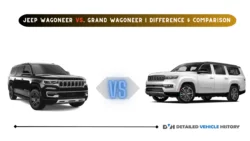Historically, chassis numbers differed from Vehicle Identification Numbers (VIN). Chassis numbers could vary in the number of characters and were usually irregular. They were also closely related to VINs but not precisely the same.
However, the chassis number and VIN are now used interchangeably to refer to the exact string of letters used to identify vehicles. In other words, they are the same. In this article, we dive deep into the widely debated “chassis number vs. VIN” topic.

Let’s get right to it.
What is a Chassis Number?
Chassis numbers were the earlier identification systems used for motor vehicles. They’re essentially a serial number the manufacturer assigns to a specific vehicle’s chassis, the main frame supporting the body and engine.
Chassis numbers, with their unique irregularity, weren’t standardized and could vary in length between 5 to 13 digits and format depending on the manufacturer’s preference.
Over the years, the term ‘chassis number’ faded and got replaced with vehicle identification number (VIN) which contains more information about the car. However, several countries, like the UAE, still use ‘chassis number’ to refer to the VIN.
What is a Vehicle Identification Number (VIN)?
Introduced in the late 1980s, the VIN became the universal identification system for all vehicles. It’s a 17-character alphanumeric code that encodes specific information about the vehicle, including:
- Manufacturer
- Model year
- Engine type
- Assembly plant
- Sequential vehicle production number, and more.
The main difference between the chassis number and the VIN is that the VIN is a standardized system, while the chassis number used to be more irregular and varied among manufacturers.
The VIN provides a consistent and comprehensive way to identify a vehicle, making it the preferred method for vehicle identification worldwide.
Where Can You Find a Vehicle Identification Number?
Finding the VIN or chassis number is extremely important, especially if you are looking for a used vehicle in the used car market. With the VIN, car buyers, sellers, dealers, and even appraisers can easily view any vehicle’s specifications, features, and vehicle history records.
But where is the VIN located? The VIN number can be found on the:
- Dashboard of the vehicle
- Driver’s side door jamb
- Engine block
- Vehicle registration documents
- Insurance documents and more.
Why is the VIN Important?
The VIN is an important means of identification because it cannot be changed and remains the same throughout a vehicle’s lifetime. This makes it perfect for storing and accessing information about a specific vehicle. You can also obtain window stickers by VIN for your vehicle.
The VIN allows consumers, businesses, and government bodies to store and access vehicle specifications, features, packages, and historical records. Here are some reasons why the VIN has gained importance in the automotive industry:
Vehicle registration and ownership records
The VIN is the primary means of identifying a vehicle in official registration and ownership records. It allows authorities and vehicle owners to track a car history report, ownership changes, and other essential details.
Warranty and recall information
Manufacturers use the VIN to track warranty claims and issue recalls. By inputting a vehicle’s VIN, owners can determine if their car is affected by a recall and take the necessary steps to have it addressed.
Insurance and financing purposes
Insurance providers and lenders rely on the VIN to verify a vehicle’s identity, history, and value when processing claims or approving financing. This helps prevent fraud and ensures accurate risk assessment.
Theft prevention and recovery
Law enforcement agencies use VINs to identify stolen vehicles and trace their origins. The unique VIN makes it harder for thieves to disguise a car’s identity, aiding recovery efforts.
Overall, the standardized VIN system has become an indispensable tool for the automotive industry, government agencies, and vehicle owners. It ensures accurate identification, record-keeping, and a range of practical applications.
Breakdown of the VIN
Each character of the VIN holds essential information about the features and specifications of a vehicle. Let’s look at a simple breakdown of the VIN:
- First character: This holds information about where the vehicle was manufactured.
- Second and third characters: These characters give details about the manufacturer. The first three characters are collectively known as the World Manufacturer Identifier (WMI)
- Fourth to eight characters: These characters make up the Vehicle Descriptor Section (VDS). They provide information about the vehicle’s make, model, engine type, engine capacity, and fuel type.
- Ninth character: This digit is known as the check digit and is a security code that checks the accuracy of the VIN.
- Tenth digit: This character shows the model year of the vehicle.
- Eleventh digit: DIsplays the manufacturing plant of the model.
- The last six digits: They make up the unique serial number of the vehicle.
How can I check VIN information?
Checking a vehicle’s VIN (Vehicle Identification Number) is essential for accessing detailed information about its specifications and history. With a VIN decoder, you can view information on the vehicle’s:
- Year, make & model
- Engine type
- Trim package, and more.
Additionally, you can also use the VIN to find out the vehicle’s history, such as its:
- Accident reports
- Service records
- Ownership details
- Title brand records
- Theft records
- Damage records
- Lien and loan records
- Mileage, and more.
By using our free VIN decoder, you can uncover all of the information above and make informed decisions when buying a used car. It’s fast, reliable, and provides all the information you need at your fingertips.
VIN, chassis number, serial number: I know you are curious if the serial and chassis numbers are the same. Let’s find out.
What is the Difference Between VIN, Chassis, and Engine Numbers?
The chassis and Vehicle Identification numbers (VIN) are the same thing – they are a unique code used to identify an individual motor vehicle. The chassis number/VIN is stamped on the car’s frame and is crucial for vehicle identification and history checks.
In contrast, the engine number is separate from the chassis number or VIN. The engine number is exclusive to the engine block and marks the engine’s size and power output.
Bottom Line
Today, the VIN is the widely accepted term for the unique identifier used for vehicles worldwide. It has replaced the more irregular chassis number system.
However, in some regions, like parts of West Africa, the term “chassis number” is still more commonly used than “VIN,” reflecting local automotive terminology preferences.
So, the next time you hear chassis number vs. VIN, be sure to remember that they both refer to the same string of characters used to identify a vehicle.









